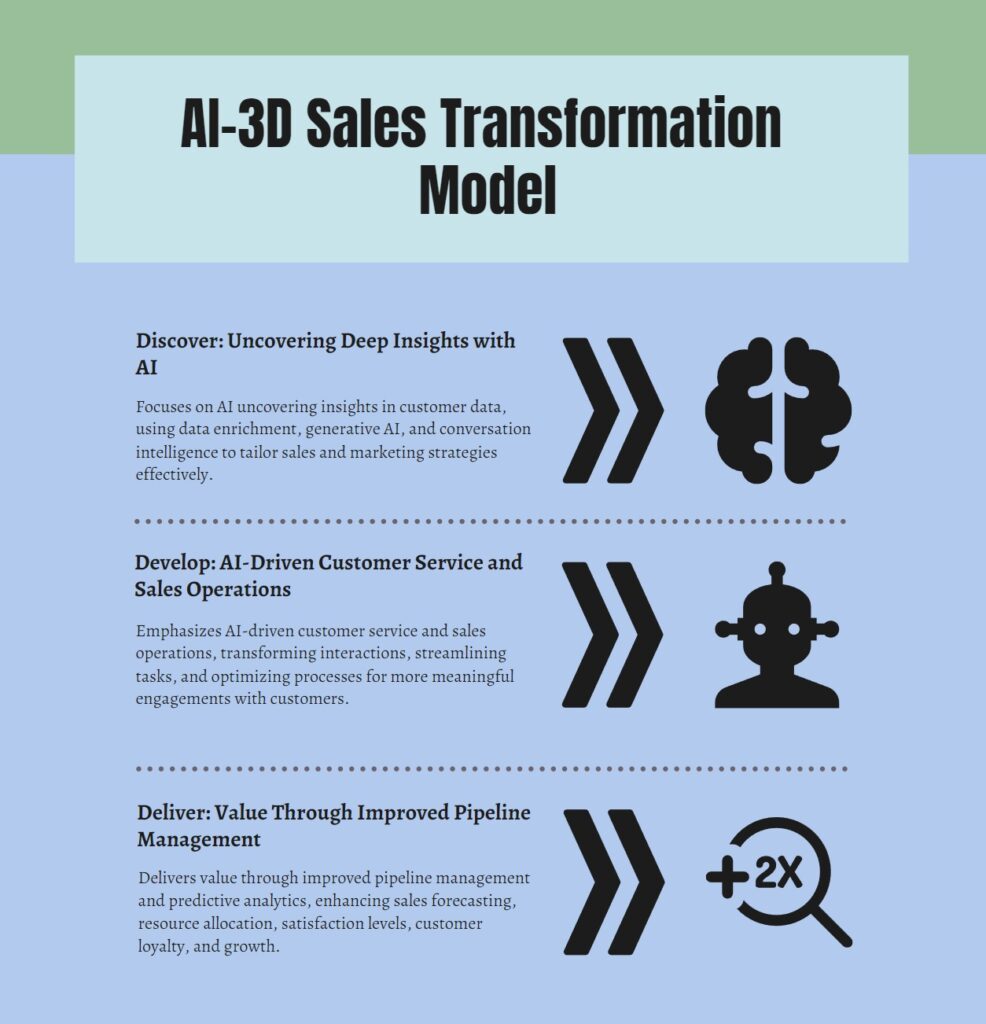The integration of Artificial Intelligence (AI) in sales is here; it’s a revolution that is redefining customer engagement and business growth.
By delving deeper into the transformative power of AI, businesses can harness its full potential to not only meet but exceed the modern consumer’s expectations. This article, supported by recent research and practical applications, outlines the path forward for businesses aiming to leverage AI in their sales strategies.
Harnessing Generative AI for Unmatched Personalization
Generative AI has emerged as a cornerstone technology for creating hyper-personalized customer experiences. It goes beyond traditional personalization methods by analyzing customer data and generating content that resonates on a personal level with individual consumers.
According to McKinsey, generative AI can significantly impact customer experience, driving growth and enhancing productivity through dynamic audience targeting and personalized content creation. This level of personalization not only improves customer satisfaction but also fosters loyalty and enhances brand perception.
Transforming Customer Service with AI
AI technologies are capable of delivering proactive and personalized services, dramatically enhancing customer interactions.
For instance, McKinsey’s research highlights that in sectors like banking, AI could unlock up to $1 trillion in additional value annually, with a significant portion derived from improved customer service. These AI-enabled services can anticipate customer needs, providing solutions sometimes even before the customer is aware of them, thus setting a new standard for customer service excellence.
Expanding the Role of AI in Sales Operations
The application of AI in sales extends into several critical areas that collectively improve the efficiency and effectiveness of sales processes:
- Advanced Data Enrichment and Insights: AI technologies offer sophisticated data enrichment capabilities, enabling sales teams to gain a comprehensive understanding of their prospects and customers. This leads to improved targeting and personalization, ultimately enhancing the effectiveness of sales efforts.
- Enhanced Conversation Intelligence: AI-powered tools are revolutionizing sales calls by providing deep insights into customer interactions. These tools analyze conversations to identify trends, objections, and opportunities, offering sales teams actionable intelligence to refine their strategies and improve performance.
- Streamlined Sales Enablement: By automating sales enablement tasks, AI allows sales teams to focus more on selling and less on administrative duties. This includes optimizing responses to RFPs, managing content libraries, and personalizing sales outreach, significantly improving the sales process’s efficiency.
- Improved Pipeline Management: AI enhances the accuracy of sales forecasting by providing predictive insights, allowing for more effective pipeline management. This capability is crucial for sales teams to allocate resources efficiently and maximize opportunities.
Strategic Recommendations for Businesses
To fully capitalize on the benefits of AI in sales, businesses should consider the following strategic actions:

- Invest in Generative AI: Prioritize the adoption of generative AI technologies to enable hyper-personalization in customer interactions, setting your brand apart in a crowded marketplace.
- Leverage AI for Customer Service Excellence: Utilize AI to transform your customer service operations into a proactive, personalized engagement model that delights customers and builds long-term loyalty.
- Optimize Sales Processes with AI: Integrate AI tools across your sales operations to streamline workflows, enhance data analysis, and improve overall sales performance.
- Commit to Continuous AI Learning: Embrace a culture of continuous learning and adaptation to stay ahead of AI advancements and their applications in sales and customer service.
AI-3D Sales Transformation Model

1. Discover: This first dimension focuses on AI’s role in uncovering deep insights and trends within vast pools of customer data. It highlights the importance of advanced data enrichment, generative AI for personalization, and enhanced conversation intelligence. Discovering these insights allows businesses to tailor their sales and marketing strategies effectively.
2. Develop: The second dimension emphasizes the development of AI-driven customer service and sales operations. This includes transforming customer service through proactive and personalized interactions, streamlining sales enablement tasks, and optimizing sales processes with AI tools. The development phase ensures that businesses can build more meaningful and efficient engagements with their customers.
3. Deliver: The final dimension is about delivering unprecedented value through improved pipeline management and predictive analytics, leading to better sales forecasting and resource allocation. By delivering on these fronts, businesses can achieve higher satisfaction levels, foster customer loyalty, and drive significant growth.
Moving Forward with AI
The integration of AI in sales presents an unparalleled opportunity for businesses to redefine their approach to customer engagement, service excellence, and operational efficiency.
By embracing AI, companies can not only adapt to the changing landscape of sales but also lead the charge in delivering exceptional customer experiences that drive growth and success in the digital age. The future of sales is here, and it is powered by AI.
Related: The AI Revolution in Business | Partial Adoption is Not Enough

